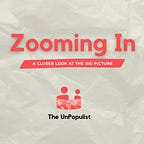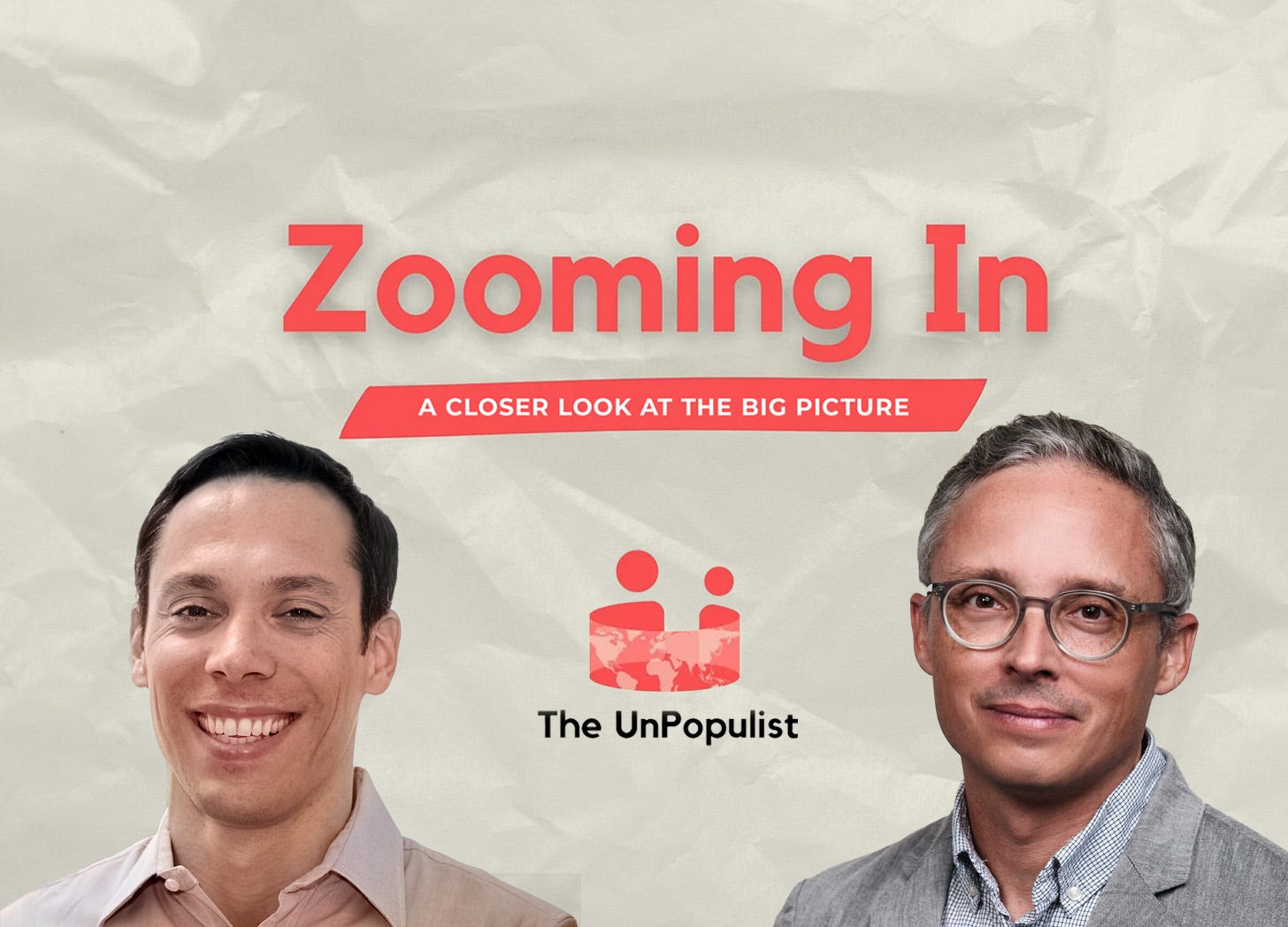Listen to Zooming In at The UnPopulist in your favorite podcast app: Apple Podcasts | Spotify | Google Podcasts | RSS | YouTube
Landry Ayres: Welcome to Zooming In at The UnPopulist. I’m Landry Ayres.
Earlier this summer, the German far-right party Alternative for Germany, or AfD, came in second place in Germany’s European Parliament elections, despite Germany’s postwar aversion to far-right populism. The AfD is known for inflammatory rhetoric about migrants and other marginalized people, and recently a member aided and assisted a full-blown coup attempt against the government … sound familiar?
On today’s episode, host Aaron Ross Powell is joined by UnPopulist contributor Tim Ganser to discuss how the AfD has capitalized on discontent, the limitations of technocratic or incrementalist politics, and what liberal movements around the world can do better to reach disaffected constituents, to reach those who feel abandoned. We hope you enjoy.
A transcript of today’s podcast appears below. It has been edited for flow and clarity.
Aaron Powell: What's going on with the far right in Germany?
Tim Ganser: The far right has enjoyed a lot of success in the last couple of years. Germany traditionally has had a social norm that precluded voting for the far right unless you essentially consider yourself a neo-Nazi. And that social norm has really been shattered, I'd say, in the last decade.
We've had the rise of the Alternative for Germany, AfD, which essentially got hijacked very early on by far-right elements and now has turned into a right-wing populist party. It's actually under surveillance by the Office for the Protection of the Constitution, which is like our national secret service. They have listed the AfD as confirmed right-wing extremists in multiple states—and the youth organization, I believe, Germany-wide.
This is a party that just got close to 16% of the vote in the election for European Parliament. It's currently polling at around the same for a hypothetical federal election, is looking at three state parliament elections that are coming up—two on September 1st and one on September 22nd—in Eastern states, and is looking to finish at the top of the pack. So it's extremely dismaying. And this rise has happened over the last 10 years.
Powell: I want to trace out that story and that evolution a bit. So how did the AfD start and what did it look like when it first started?
Ganser: The AfD started back in 2013—in the middle of the euro crisis. Angela Merkel is going in with bailouts. Germany and the rest of Europe is seen as being very strict with the Maastricht criteria and being hard on the countries that are in trouble. Inside Germany, there's a lot of disgruntlement that we are helping bail out our poorer cousins. And so the AfD was started by a group of conservatives, a bunch of them professors, led by an economics professor named Bernd Lucke. And it was really started as an alternative to Angela Merkel's approach to the euro crisis.
Even the name … it wasn't really a nationalist kind of name. Angela Merkel kept talking about how the policies she was implementing were without alternative. “Alternative loz de politik,” is what she said. So it was essentially … “We were offering an alternative.” So it was started by respectable conservatives—economics professors, a bunch of other professors, former members of the Christian Democrats. But then it unraveled really quickly.
Powell: What does that unraveling look like?
Ganser: So the party in 2013 immediately got 4.7% vote share, which is just under the hurdle to make it into the Bundestag, the federal parliament in Germany—but it was the best showing of a new party in the history of the federal republic. It also immediately swelled in membership. It was started in February of 2013 and by May it had over 10,000 members, which in Germany that's pretty quick. You don't need to register as a member to serve—like you do in the U.S. for the primary system. People who join a party are really committed to that party. But that increase in membership already sowed the seeds for the turn to the right wing. There were a lot of right-wing elements. Not just economic hardliners, but people who had a general right-wing populist outlook that latched onto this party.
I think for some of the leadership out of negligence—Bernd Lucke I would include in that group—and for some others maybe out of calculation, they let it happen. Bernd Lucke actually at some point became concerned enough that he said, “We need to vet people who join our party. … Are these neo-Nazis? Are these people engaged in activities that we just consider beyond the pale for our party?” Some of the local chapters did that very thoroughly. The problem was that there were already other local chapters that probably felt a certain kinship to that thinking. So those people might try to join the party in one town, be turned down, go 10 miles down the road and join there. So, they just didn't get a handle on it early enough. That then allowed these right-wing elements to really take over.
In addition, in 2014, there was a large protest movement in Germany. They called themselves PEGIDA, a German acronym which stands for Patriotic Europeans against the Islamization of the Occident, a ludicrous group that was essentially shouting against Angela Merkel's taking in of refugees because we had this big refugee crisis in Europe. You can think what you want how sensible it was … the way Angela Merkel went about that. But PEGIDA was very, very hardline, with nationalistic, neo-Nazi elements in it. The right wing of the AfD saw an opportunity to become the party of these PEGIDA protesters. So that then led to a rift within the party that culminated in a party congress. This is in 2015 already, so just two years after the founding. Bernd Lucke, the founder, the initiator of the party, lost the party leadership at that party convention and was replaced by a much more right-wing successor named Frauke Petry. Actually, in the wake of the convention, he left the party saying, “This is a right-wing shift that I cannot support.” And many of his fellow founders would leave in the years after, or some had already actually even left before him.
In my opinion and my reading—I’m certainly not alone; there are others who take the same interpretation—this really was the moment where hard-right populists found a Trojan horse to really start fighting the system from within. Because you have this party that was started, that had respectability when it was started, and now they were able to capture it. But it still had this veneer of respectability, which allowed people who were attracted by these hard, right-wing ideas, but who would not have voted for a neo-Nazi party. They felt able to say, “You know what, this is a respectable party. I can vote for them.” This was, I think, the genesis of the party. Then, once they essentially had control of the leadership, you see very quickly a shifting of the Overton window where they really expand to the right what is possible to say, what is possible to propose as policies, and really shift the discourse.
Powell: This raises an interesting question about the emergence of the far right, not just in Germany. That point that you made about there being a party that was credible and respectable and taking it over from within ... that stood out to me in your UnPopulist article as quite analogous to what we're seeing in the United States with the Republican Party. If you had started a new party, the party of right-wing authoritarianism, it wouldn't have gotten much traction, even setting aside the reason that there's only two parties in the U.S. But if you take over the Republican Party from within, you have this whole cultural infrastructure of respectability that we assume this thing that was respectable still remains respectable, and we have to talk about it in that way. And we can't really adjust our perspective to what it's become. So it's almost like our language and political concepts fail us.
But it raises the question of, “Why now?” When you mentioned the euro crisis, you mentioned Islamic immigration, but a lot of the time these far-right populist parties, they can point to things that they don't like at any given moment, but there's an underlying motivation, just kind of a grab bag of grievances and identity. And that's not new. As you said, it was not acceptable in Germany for quite some time to vote for the far right. Germany has a lot of cautionary history about the far right. So is this an instance of the people who are now voting for this, who are supporting these kinds of views—whatever party they happen to be latched onto at any given time—in a way that they hadn't before … is this the result of political sentiment and personal ideology in Germany turning in a more rightward direction? Or is this instead a product of this kind of far-right ideology had been more present in Germany over the last however many decades than it was comfortable to admit? And now they just feel empowered to let it out.
“And then you have right-wing populists coming in and they're good at storytelling.
For two reasons: One, they don't care about facts. They're perfectly happy lying, which I think none of the mainstream parties in Germany really are. And second, they're appealing to nostalgia.” — Tim Ganser
Ganser: I think it's a little bit of both. So there's a survey that's done that essentially gets at this kind of right-wing sentiment that exists in the population. They have an authoritarianism scale. And they always found that there was an uncomfortably high percentage—somewhere between 15 and 25%. And there's been a bit of an uptick, but that wasn't the shift that really got the AfD going. I mean, you do have World War II, the Nazi regime, you have it receding ever further into the past. There are few people who remember it first-hand. So I think that plays a bit of a role. But I think these grievances and the feeling of being left behind, the same things in the U.S. that have made Trump possible, that's also true in Germany.
Ever since I wrote the article, I've been thinking a little bit about, you know, what have the defenders of liberal democracy, where have the traditional parties gone wrong? I think part of it is, there was to some extent too much technocracy. Angela Merkel, in my judgment, is a very decent person. I think she tried to do the best she could. I think her personal integrity is beyond reproach. But she's a very clear technocrat. She never laid out a vision for society. There was never a unifying story. I think, in Germany, across the spectrum, maybe with a little exception for the Greens, where the story is climate change, this is the topic for our time, we need to figure out what to do. But the traditional party is not telling a story; they’re saying, “We're managing things the best we can.”
So, in the East, obviously after reunification, you have people who don't just feel left behind but who literally are left behind. You're 45, 50 at time of reunification. Chances are if you lose your job, you're not going to find another good job. And so this feeling of being left behind is real. But then in the last 20 years, the number of financial crises, also globalization, picking up yet more speed. I think people are feeling generally more unmoored. And then you have right-wing populists coming in and they're good at storytelling.
For two reasons: One, they don't care about facts. They're perfectly happy lying, which I think none of the mainstream parties in Germany really are. And second, they're appealing to nostalgia—a pretty powerful feeling and an easier appeal than trying to lay out some vision for the future where you say, “Look, you know, we haven't figured it all out, but we're trying to go forward in this direction.”
I think that's the hard work that the parties that are on the democratic spectrum, lowercase “d,” have to do because I think that's where they've lost a lot of people. They've offered incremental solutions and “Look, there's a program here” and “We've done something here,” but there's no story and as I said before identity is very important. There's a British playwright. His name is Simon Stephens. He gave a speech in 2018 in Hamburg and he talked about Brexit. Michael Gove, who was one of the leading proponents of Brexit, one of the Tories, was asked in an interview, “What do you say to the fact that all experts are saying Britain will suffer from the isolationism, from the isolation it will impose on itself if it goes through with Brexit?” And he just said, “I think we've had quite enough of experts, haven't we?” And Simon Stephens, in his speech, described how that chilled him and it angered him. And then a couple of days later, he talked to his son and his son said, “Yeah, but Gove was right.” He said, “What do you mean?” His son was not a Brexit supporter, but he said, “Look, if somebody came to you, dad, and said all the experts agree that leaving the E.U. will have some economic benefits, would you vote for leaving?” He said, “No, of course not. I believe in the story of the E.U.” And so his son said, “Well, yeah, that's the problem. We're talking about experts. They're talking about a story.” And I think that really is where liberal Democrats need to do better.
Powell: I love that you brought that up. This is something that I think about a lot and is spot on in the sense that so much of the appeal of the right is construction of narrative and a particular kind of narrative where the aggrieved person or group, whether that's the rural poor or Christian evangelicals or some historical ethnicity that imagines themselves to be the genuine volk, are the protagonists of this story. You're told, “Look, the reason that you are dissatisfied or suffering right now is because antagonists have done something to you. And we as your representatives will step in, be your avatars in carrying this conflict forward against these people.” “We're in a struggle for civilization in the same way that, you know, so many of our fictional stories are about these great struggles between the forces of good and the forces of evil.” We all cast ourselves as the forces of good, never as the forces of evil.
But I think you're right that this poses a real challenge for liberalism because to some extent, the essence of liberalism is saying there isn't a single story like that because all of us are different and diverse and have different preferences and interests and cultures and languages and so on. And so how do you think about coming up with stories that don't just turn into another form of illiberal exclusionism of like, “Okay, here is the real Germany and its story,” or “Here is the real America and its story”?
Ganser: I really don't have the answer. But I was thinking along the same lines where defending democracy is just harder. It's harder to tell a story because liberal democracy is supposed to leave room for all these different groups. And it reminded me of the fact that Winston Churchill, who certainly was eloquent, the best defense he could come up with for democracy was, well, it's the least bad form of government. It's just hard to grip people with that. And I think that's what we're struggling with.
I also talked to friends, family members here about rise of the AfD. My grandmother's 91 and so we talked. She was a child during World War II but old enough that she remembers and there were ethnic Germans in the Czech Republic, what was then called the Sudetenland, who actually ended up being refugees and we talked about people feeling aggrieved and she said “I don't understand people. People just forget how good they have it today.” She was like, “War is terrible.” Europe, in a broader context, has reaped a huge peace dividend. Since World War II, we've had fantastic prosperity. The poorer countries have also grown a lot. And it sometimes does feel a little bit like people just forgot how bad things can get if you go with your disgruntlement and vote for the people offering the simple answers. They don't actually care about offering a real answer. All they care about is getting empowered and implementing whatever their program is. We should take right-wing extremists at their word when they talk about, in secret conferences, that they want to have forced remigration of non-ethnic Germans, which they derisively call “passport Germans.”
As an undergrad, I studied German history, particularly the Nazi history with Thomas Childers at the University of Pennsylvania. And one thing that stuck with me that he always said was, “You know, the Nazis never got a majority of the vote. It was enough that they could take power.” And he was one of the first to really analyze the voting patterns. And he said, “Their support was a mile wide, but it was only an inch deep. But that's enough.” Sometimes I worry a bit that we're underestimating these risks. When I look at all the parties that are firmly within the democratic spectrum, it should be clear that our biggest problem right now is not whether taxes are a bit higher or a bit lower or we have better social security or worse social security. We have an extreme right-wing party that is trying to get into power and is much closer than anybody should be comfortable with.
And you have some conservatives making these equivalencies between the AfD and the Greens. And I understand relatively staunch conservatives don't like the Greens. That's fine. I understand. I can understand it and the Greens do some things that you have to shake your head at, but they're not trying to get rid of our system. They're not trying to abolish liberal democracy. And that is something that I find just very alarming, that you still have Christian Democrats who are saying, “The Greens are just as bad.” It's like, you need to figure out how to work with the other parties in the democratic spectrum. And that should be the task.
“[D]efending democracy is just harder. It's harder to tell a story because liberal democracy is supposed to leave room for all these different groups. And it reminded me of the fact that Winston Churchill, who certainly was eloquent, the best defense he could come up with for democracy was, well, it's the least bad form of government. It's just hard to grip people with that. And I think that's what we're struggling with.” — Tim Ganser
Powell: It reminds me of conversations that I had when I was working in public policy in Washington, D.C., during the Trump administration and during the early days of it when it became clear that he was going to try to do all sorts of things that were not just bad from a policy perspective, but bad from a democracy and liberalism and open society perspective. And so many people who had spent so long in the political world and in the public policy world—think-tankers, party apparatchiks, activists, people who are in that environment—are so used to thinking about things within this set of parameters. The reaction was “No, we should just talk about, if Trump proposes a policy that has some good elements, talk about the good elements. If he proposes a policy that has some bad elements, talk about the bad elements. But basically treat it as … normal.” I like the line that the humor writer P.J. Rourke used: “wrong within normal parameters.”
So there was this real aversion to saying, “No, this is a unique threat.” And to some extent, that means setting aside some of those policy questions and policy differences. You can dislike what the Greens are up to, or you can dislike some of Joe Biden's policies, but if Trump regains power or if the AfD takes control, it basically moots all of those conversations. Now we're in authoritarianism, we're in far-right populism, we're in fascism, and you're not getting your policy preferences either way. It feels like one of those things where the way that you get people to wake up to it is for them to see how bad it could get. But the problem is that if it gets that bad, it may not be recoverable.
Ganser: Some people seem to lack the imagination of how bad it can get and you hope it never gets there because once they're convinced it's likely too late. So for an audience that is not German I want to throw in one thing to also show just how far beyond the pale the AfD is. There was, at the end of 2022, the largest anti-terrorism raid that the German police ever carried out. Something like 5,000 police officers were involved and they arrested 25 people—a fringe right-wing movement called Reichsbürger. They believe that the Federal Republic of Germany is a limited liability corporation, has no actual authority, and the real Germany is still the Reich, not the Nazi Reich, but the Empire, Imperial Germany. So you hear that and you're like, “Okay, bunch of lunatics. How bad can it be?”
But they were planning a putsch. They were planning violent overthrow of the government. They were stockpiling weapons, they were stockpiling gold, they had former elite soldiers in their ranks, they already had a shadow cabinet and they were essentially preparing for day X where they would storm the Reichstag, where parliament meets, take parliamentarians hostage, and their plan was incite violence everywhere and they would implement their shadow government. The person they had tapped as Minister of Justice—Attorney General essentially—is a now suspended judge, but a German judge. She's an AfD politician. She was a member of parliament. She then failed to get elected in the ’21 election. She used her pass, her access privileges, as a former member of parliament. She used her access pass to get the conspirators in so they could take photos and essentially case the joint. These 25 people are now all on trial for terrorism and high treason. But this is what we're talking about.
I think everybody needs to wake up and understand that even the ones trying to fight the system from within, there's probably at least 50% that would hope for the same outcome. Not a liberal government, not a liberal democracy in any way, but a government that will take Germany back for the Germans, however they constitute them.
“I do think that there's a waking up to this idea that just being a more efficient technocrat is not going to deal with this. This whole idea about telling better stories is not my idea.” — Tim Ganser
Powell: Are there any signs of hope here? Any signs that there may be a counter-movement? We just saw an election in France where the left was able to come together and fight. We saw the election in the U.K. where Labour won handily, but the far right gained more than it had in the past. So there seems to be mixed results. Is there any reason for optimism in Germany?
Ganser: At the moment I find it a little hard to be optimistic. To look on the bright side, I do think that there's a waking up to this idea that just being a more efficient technocrat is not going to deal with this. This whole idea about telling better stories is not my idea. There's a quite good book in German by Carsten Brosda, a social democratic senator for culture in the German city-state of Hamburg. He writes about the storytelling. He also talks about how he thinks his party also went through a technocratic phase. He believes it's already coming out of it. I'm a little bit more skeptical with our current chancellor. But he identifies that what's missing is that people no longer find a sense of community. And then it's easy to look elsewhere.
Maybe the European Parliament elections was a forecast, but people were still shocked. People who did not vote for the AfD were still shocked that the AfD got 16% of the vote. And if the AfD performs as strongly as they're predicted to perform in these three states where they might end up being the strongest party in September, I would also hope that that finally gets everybody's attention. Because I do believe that the majority—I mean, even if they get 30%, that still leaves 70% of people who don't agree with their illiberal outlook. But setting aside these inter-party differences still on the democratic spectrum … it’s just hard. They had more than 50 years where there were no parties outside trying to fight the system. So they fought each other and I mean, that's what they're supposed to do. They're supposed to propose ideas, but they need to wake up and fast. I think there's always a reason for hope, but at the moment it looks a little dark, I would say.
Landry: Thank you for listening to Zooming In, a project of The UnPopulist. For more like this, make sure to subscribe for free at theunpopulist.net. Until next time.
The UnPopulist invites interesting thinkers from across the political spectrum to foster a wide-ranging and thoughtful conversation to advance liberal values, including thinkers it may—or may not—agree with.
© The UnPopulist 2024



















